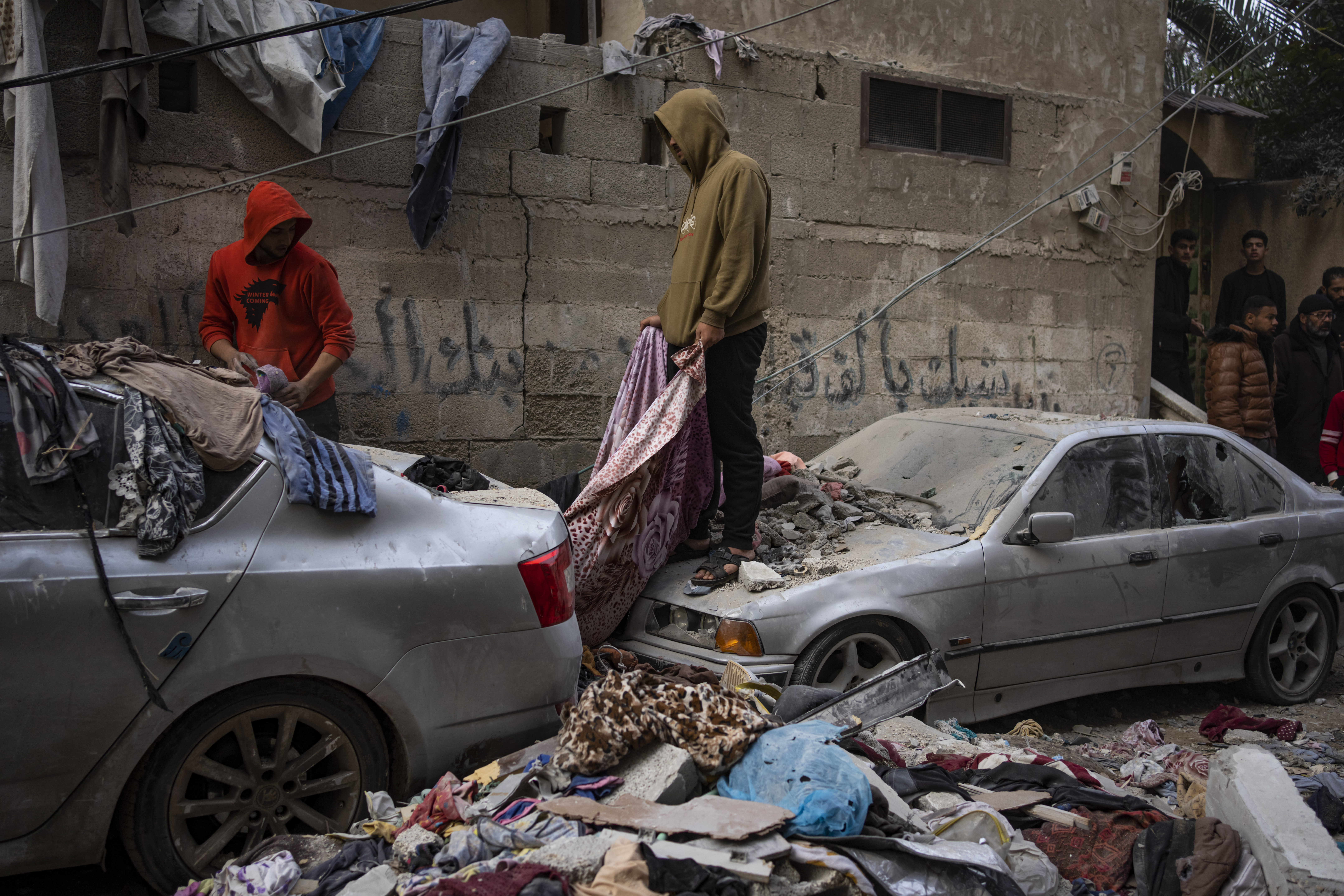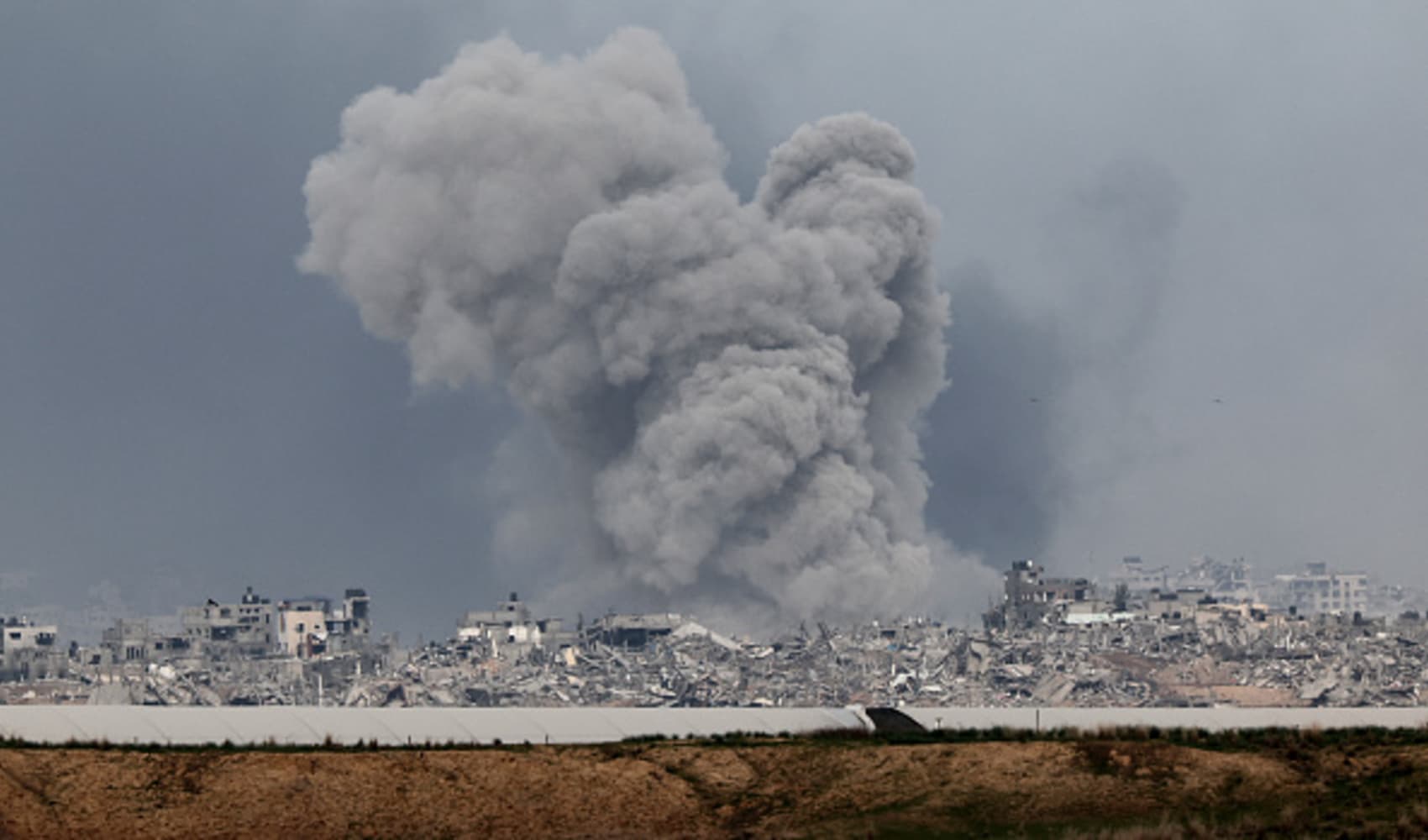
Israeli forces rescued two hostages early Monday, storming a heavily guarded apartment in the southern Gaza Strip and extracting the captives under fire in a dramatic raid that was a small but symbolically significant success for Israel. The operation killed at least 67 Palestinians, including women and children, according to Palestinian health officials in the beleaguered territory.
To assist the rescue forces, heavy airstrikes pounded the area near the apartment in Rafah, a city on the southern edge of the Gaza Strip where 1.4 million Palestinians have fled to escape fighting elsewhere in the Israel-Hamas war.
The raid was celebrated in Israel, which has been seeking the release of more than 100 captives still held by Hamas and other militant groups, and briefly lifted the spirits of a nation still reeling from Hamas' cross-border raid last year.
But the operation also brought heavy airstrikes pounding on Rafah, the city on the southern edge of the Gaza Strip where 1.4 million Palestinians have fled to escape fighting elsewhere in the Israel-Hamas war. Dozens were killed.
Get top local stories in Philly delivered to you every morning. >Sign up for NBC Philadelphia's News Headlines newsletter.
More than 12,300 Palestinian minors — children and young teens — have been killed in Israel’s war against Hamas, the Health Ministry in Hamas-run Gaza said Monday. That means minors make up about 43% of the total number of 28,176 Palestinians killed so far. About 8,400 women were also among those killed.
The ministry, which does not distinguish between combatants and civilians, provided the breakdown of minors and women at the request of The Associated Press. Israel claims to have killed thousands of Hamas fighters.
The plight of the hostages has profoundly shaken the nation and Israel has made freeing the dozens of remaining captives a top aim of its war, along with destroying Hamas' military and governing capabilities. But as the war drags on, now in its fifth month, their freedom remains elusive and rifts have emerged in Israel over the best approach to end their ordeal.
Israeli Prime Minister Benjamin Netanyahu has insisted persistent military pressure will bring about their freedom — a position he repeated on Monday — even as other top officials have opposed this, saying a deal is the only way to secure their release.
Israel has described Rafah as the last remaining Hamas stronghold in Gaza and signaled that its ground offensive may soon target the densely populated city. On Sunday, the White House said President Joe Biden had warned Netanyahu that Israel should not conduct a military operation against Hamas in Rafah without a “credible and executable” plan to protect civilians.
The army identified the rescued hostages as Fernando Simon Marman, 60, and Louis Har, 70, abducted by Hamas militants from Kibbutz Nir Yizhak in the Oct. 7 cross-border attack that triggered the war.
They were among roughly 250 taken captive during Hamas' stunning cross-border raid, when an estimated 1,200 people, mostly civilians, were killed, according to Israeli authorities. Israeli's retaliatory air and ground offensive has killed over 28,000 Palestinians, according to local health officials, displaced over 80% of the population and led to a massive humanitarian crisis.
Over 100 hostages were freed during a weeklong cease-fire in November. Israel says about 100 hostages remain in Hamas captivity, and Hamas also holds the remains of roughly 30 others who were either killed on Oct. 7 or died in captivity. Three hostages were mistakenly killed by the army after escaping their captors in December.
“Only the continuation of the military pressure, until total victory, will bring about the release of all of our captives,” Netanyahu said in a statement.
A DRAMATIC RAID
Israeli military spokesman Read Adm. Daniel Hagari said special forces broke into a second-floor apartment in Rafah under fire at 1:49 a.m. Monday, accompanied a minute later by airstrikes on surrounding areas. He said the hostages were being guarded by armed Hamas militants and that members of the rescue team shielded the hostages with their bodies as a heavy battle erupted in several places at once with Hamas gunmen.
The rescue, which Hagari said was based on precise intelligence and planned for some time, is a morale booster for Israelis but a small step toward winning the release of the remaining hostages, who are believed to be spread out and hidden in tunnels, likely in poor condition.
Har and Marman were kidnapped from a home in southern Israel along with three other relatives who were freed in the late-November deal. No other family members of theirs remain in Gaza, Israeli media reported.
Har's son-in-law, Idan Begerano, who saw the released captives at the hospital, said the two men were thin and pale, but communicating well and aware of their surroundings. Begerano said Har told him immediately upon seeing him: “You have a birthday today, mazal tov."
DOZENS KILLED IN STRIKES
The airstrikes that backed up the Israeli forces hit the jam-packed Rafah in the middle of the night and dozens of explosions could be heard around 2 a.m. Ashraf al-Qidra, spokesman for the Health Ministry in Hamas-run Gaza, said at least 67 people were killed in the strikes.
Al-Qidra said rescuers were still searching the rubble; an Associated Press journalist counted at least 50 bodies at the Abu Youssef al-Najjar Hospital in Rafah.
Footage circulating on social media from Rafah's Kuwaiti hospital showed dead or wounded children. The footage could not immediately be verified but was consistent with AP reporting.
The wounded were seen lying on the hospital floor as medics tried to treat them. One wounded man was on the ground with two bloodied children lying beside him. “Rescue the girl,” he screamed.
A young man was also seen carrying the body of an infant who he said was killed in the attacks. He said the girl, the daughter of his neighbor, was born and killed during the war.
“Let Netanyahu come and see: is this (infant) your bank of targets?" he said. "For what is she to blame?”
CONCERNS ABOUT RAFAH
Netanyahu has said sending ground troops into Rafah is essential to meeting Israel's war goals. Biden has urged Israel to exercise extreme caution before moving in. More than half of Gaza's 2.3 million population is now crammed into Rafah, where hundreds of thousands live in sprawling tent camps and overcrowded U.N. shelters.
Biden's remarks, made in a phone call with Netanyahu late Sunday, were his most forceful language yet on the possible operation. Biden, who last week called Israel’s military response in Gaza “over the top,” also sought “urgent and specific” steps to strengthen humanitarian aid. Israel’s Channel 13 TV said the conversation lasted 45 minutes.
Discussion of the potential for a cease-fire agreement took up much of the call, a senior U.S. administration official said, and after weeks of diplomacy, a “framework” is now “pretty much” in place for a deal that could see the release of remaining hostages held by Hamas in exchange for Palestinian prisoners and a halt to fighting.
The official, who spoke on condition of anonymity to discuss negotiations, acknowledged that “gaps remain,” but declined to give details. The official said military pressure on Hamas in the southern city of Khan Younis in recent weeks helped bring the group closer to accepting a deal.
Netanyahu’s office declined to comment on the call. Hamas’ Al-Aqsa television station earlier quoted an unnamed Hamas official as saying any invasion of Rafah would “blow up” the talks mediated by the United States, Egypt and Qatar.
Biden and Netanyahu spoke after two Egyptian officials and a Western diplomat said Egypt threatened to suspend its peace treaty with Israel if troops are sent into Rafah. The Camp David peace accords have been a cornerstone of regional stability for over 40 years. Egypt fears a mass influx of Palestinian refugees who may never be allowed to return.
___
Federman reported from Jerusalem. Associated Press writers Sam Magdy in Cairo and Colleen Long in Washington contributed to this report.



